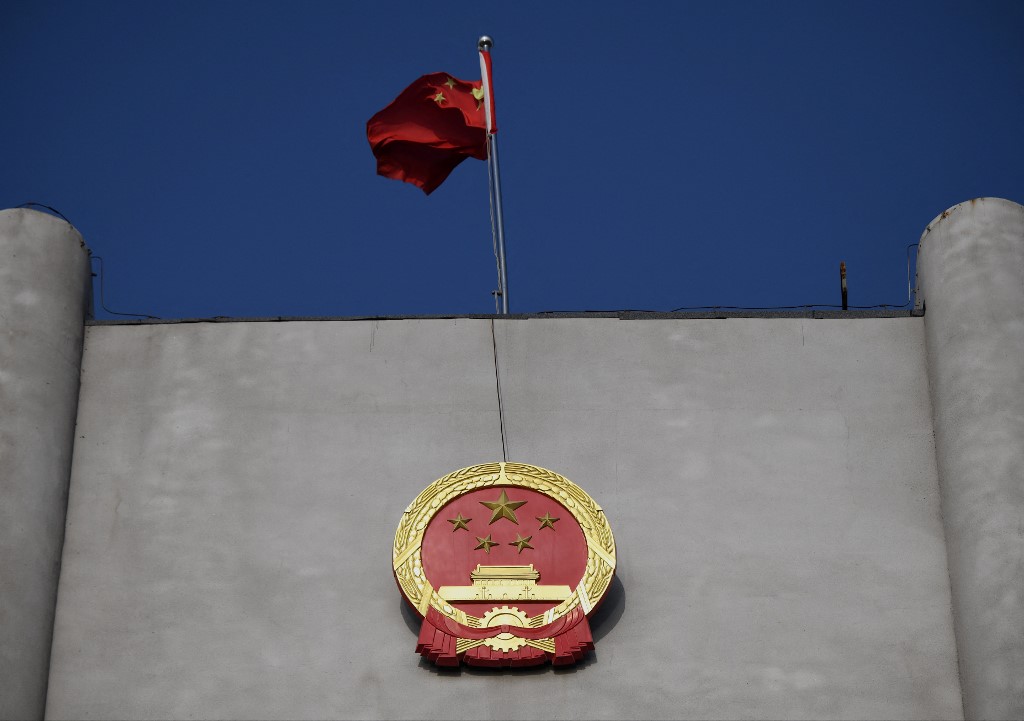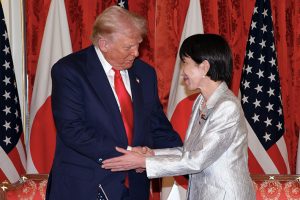Legal experts say the new law could put foreign businesses in a bind if they cannot legally comply with both US and Chinese directives, while the broad scope of the law means even scholars, pundits or think tanks could be sanctioned for supporting a Western call for sanctions on China
(AF) China on Thursday passed a new law to counter foreign sanctions, as it looks to build defences against rising US and European Union (EU) pressure over trade and human rights.
Beijing has accused the US of “cracking down” on Chinese companies and threatened retaliation after US President Joe Biden last week expanded a blacklist of foreign companies in which Americans are barred from investing, on grounds of ‘national security’.
“In recent years, in order to curb China’s development, some Western countries have used pretexts including Taiwan, Hong Kong, Tibet, Xinjiang, and pandemic related issues to suppress China, interfering in China’s internal affairs and seriously violating international law and the basic norms governing international relations,” Shen Chunyao, director of the legislation unit of the National People’s Congress (NPC) Standing Committee, said in a statement.
The purpose of formulating the law was to counter “unilateral sanctions” on China imposed by some Western countries so as to safeguard China’s national sovereignty, security and development interests, Shen said.
The Anti-Foreign Sanctions Law, published on Thursday, would take effective “immediately”, China’s top legislative body said.
What can it do?
The law specifies three types of counter measures, which include:
# Refusing to issue visas, banning entry into China, invalidating visas, and deportation;
# Sealing, seizing or freezing movable, immovable and other types of property in China;
# Prohibit domestic organizations or individuals from conducting related transactions.
It also includes “other necessary measures.” The restrictions may also apply to individuals and organizations that are:
# Spouses or immediate family of people included on an anti-sanction list;
# High-level executives or actual controllers of organizations included in the anti-sanction list;
# Organizations in which the people included in the anti-sanction list serve as high-level executives;
# Organizations that are controlled, founded or operated by people and organizations included in the anti-sanction list;
China’s Anti-Foreign Sanctions Law also allows the country’s courts to punish companies for complying with foreign laws that infringe on national interests.
In addition, the law states that companies or individuals in China do not need to comply with foreign restrictions.
How could it impact on business?
The law is broad and “significantly increases the punitive power of China’s anti-sanctions measures”, University of Hong Kong associate professor Angela Zhang said.
“The broad scope of this framework means that lots of folks, like scholars, pundits, think tanks, could be sanctioned for supporting sanctions on China,” warned Julian Ku, an expert on international law at Hofstra University.
The law could also put foreign businesses in a bind if they cannot legally comply with both US sanctions and Chinese prohibitions.
In January, American asset manager State Street Corp found itself caught between Washington and Beijing when its decision to stop the Tracker Fund of Hong Kong (TraHK) from investing in US-banned Chinese companies sparked anger from some investors. Some called for the manager of Hong Kong’s most active exchange-traded fund (ETF) to be replaced.
Hong Kong leader Carrie Lam said the Hong Kong Monetary Authority (HKMA) has the power to appoint a different firm to manage TraHK, to safeguard the interests of retail investors and pensioners.
State Street subsequently reversed the decision, saying neither it nor the ETF was a “US person” that needed to comply with the US restrictions.
Foreign companies are regularly caught in the crosshairs of tension between China and Western nations, including recent nationalist attacks on fashion brand H&M for voicing concern about forced labour claims in Xinjiang.
Why now?
The law builds on earlier measures which prevent companies and individuals from complying with foreign sanctions targeting China.
In an explainer on the National People’s Congress website, an official said the law was passed in a short period of time because there was “an urgent need to counter the hegemonism and power politics of certain Western countries”.
The law will help “counteract the containment and suppression” China faces, the official added.
The new law was drafted taking reference of European Union’s experience, and would provide legal ground for anti-sanction measures implemented by related government bodies, Huo Zhengxin, a professor at the School of International Law of China University of Political Science and Law, told State-run news agency Xinhua.
“The US and some other Western countries have used their domestic laws as pretexts to execute ‘long-arm jurisdiction’ over other countries. To counter the ‘long-arm’ that may reach out at any time, we need to enrich our legal ‘toolbox’ to address challenges and prevent risks”, Huo added.
How much of a threat is it?
The section allowing for retaliatory sanctions “is unprecedented compared to other countries’ sanctions regimes”, Ku from Hofstra University said.
Angela Zhang, from University of Hong Kong, believes Chinese authorities will not immediately wield the new powers, given that anxiety among foreign businesses could lead to more decoupling.
“If, however, foreign governments continue to press on with aggressive sanctions, then I believe China will start deploying those anti-sanctions laws to demonstrate their coercive power,” she said.
Beijing has long complained about the extra-territorial application of US law through sanctions and trade restrictions.
The US and China have engaged in tit-for-tat sanctions in recent years after former US President Donald Trump initiated a decoupling with Beijing, insisting America wasn’t getting a fair deal from trade with China. Washington’s Western allies, including the EU, also sanctioned Chinese businesses and officials.
In January, China slapped sanctions on 28 members of the Trump administration on the heels of new US President Joe Biden taking office.
Sino-US competition has continued under the Biden administration. On Tuesday, the US Senate passed the ‘US Innovation and Competition Act’, a $250 billion bill which aims to ensure that Washington remains a tech powerhouse despite China’s rise.
The bill also prohibits downloading the TikTok application on government equipment and stops the US government’s procurement of Chinese drones.
In recent months, Biden has stepped up US criticism of China, both over intellectual property theft and alleged human rights abuses in Hong Kong and against Muslim minorities in Xinjiang.
Last week, Biden amended a Trump-era ban on US investment in Chinese companies, expanding the blacklist to include 59 Chinese companies, up from 31.
Many of the companies in Biden’s order were already on the Trump administration’s list, including China’s three largest telecom operators, top chipmaker Semiconductor Manufacturing International Corp, and video surveillance company Hikvision.
Companies newly-blacklisted include Zhonghang Electronic Measuring Instruments Co. and Jiangxi Hongdu Aviation Industry Co.
(With reporting from Agence France-Presse)
























